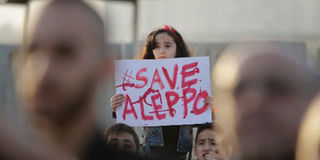UN warns of war crimes over Aleppo carnage

A Syrian girl holds a placard during a rally in solidarity with Aleppo, in the Lebanese northern port city of Tripoli, on May 1, 2016. AFP PHOTO
What you need to know:
- A bid by the council in 2014 to refer Syria to the ICC was blocked by China and Syrian ally Russia, and it appeared unlikely that a new push for such action would garner enough support.
- UN aid chief Stephen O'Brien said "life for people in Aleppo is horrendous" as he condemned the "inexcusable, deeply disturbing attacks" on medical facilities.
- Hospitals in both rebel and government-held areas of Aleppo have been hit, triggering global outrage and calls for an end to the fighting.
Two top UN officials told the Security Council Wednesday that those responsible for hospital attacks and starvation sieges in Syria's frontline city of Aleppo should face trial for war crimes.
The 15-member council met to discuss the crisis in Aleppo just as the United States and Russia agreed to extend a truce to end nearly two weeks of near-constant attacks in the northern city.
"Let me be absolutely clear once again: intentional and direct attacks on hospitals are war crimes," said the UN's top political affairs official, Jeffrey Feltman.
"Using starvation as a weapon during conflict is a war crime."
Feltman demanded that Syria be referred to the International Criminal Court in The Hague for war crimes prosecutions.
"Those responsible for war crimes must be held to account," he said.
A bid by the council in 2014 to refer Syria to the ICC was blocked by China and Syrian ally Russia, and it appeared unlikely that a new push for such action would garner enough support.
UN aid chief Stephen O'Brien said "life for people in Aleppo is horrendous" as he condemned the "inexcusable, deeply disturbing attacks" on medical facilities.
Those responsible for the attacks "must understand that these acts cannot and will not be forgotten," said O'Brien.
"Those who are responsible must know that they will one day be held accountable," he added.
Hospitals in both rebel and government-held areas of Aleppo have been hit, triggering global outrage and calls for an end to the fighting.
The upsurge in Aleppo has left hundreds dead and is threatening to derail international efforts to resume peace talks in Geneva this month and push ahead with a plan to end the five-year war.
The United States, France and Britain put the blame squarely on the regime for the escalation, but Russia insisted Bashar al-Assad's forces are fighting terror groups in the city.
"The regime has launched more than 300 air strikes, 110 artillery strikes and 18 missiles, and dropped more than 68 bombs on the city over just these last two weeks," US Ambassador Samantha Power told the council meeting.
Power rejected Russian and Syrian claims that the attacks were directed at extremists, saying recent targets included an ambulance, a market, a bakery, a school and a mosque.
Syria's Deputy UN Ambassador Mounzer Mounzer said regime forces were taking on terror groups in Aleppo.
"What the Syrian government has been doing in the city of Aleppo is merely the fulfilment of its obligations to protect its citizens from terrorism," he told the council.
Russian Ambassador Vitaly Churkin insisted that jihadist groups in Aleppo were not covered by the ceasefire agreed in late February and that "to make a pause in the combat of terrorism and allow them to regroup is unacceptable".
Syria's conflict erupted in 2011 after anti-government protests were put down. Fighting quickly escalated into a multi-faceted war that has killed more than 270,000 people and forced millions from their homes.





